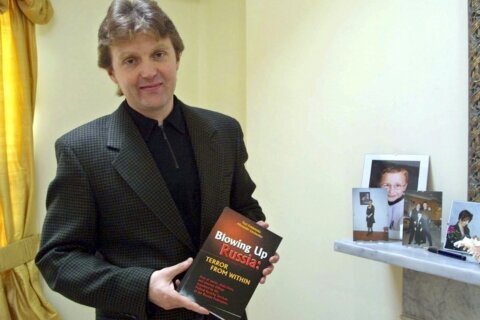ANKARA, Turkey (AP) — A court in Istanbul on Friday again ruled to keep a leading Turkish philanthropist in jail in defiance of repeated calls by Europe’s top human rights organization and its judiciary arm for his release.
Businessman and civil rights activist Osman Kavala, 64, who has been behind bars for some four years, is accused of allegedly attempting to overthrow the Turkish government through the 2013 nationwide demonstrations that started at Istanbul’s Gezi Park. He has also been charged with espionage and attempting to overthrow the government in connection with a failed military coup in 2016.
The European Court of Human Rights ruled for Kavala’s release in December 2019 but Turkish authorities have ignored that, keeping Kavala in prison since his arrest in November 2017.
Last month, the 47-member Council of Europe — of which Turkey is a member — said it would start infringement proceedings against Ankara, unless Kavala is released before its next committee of ministers meeting in November. The infringement proceedings could result in punitive measures against Turkey, including its possible suspension from the organization that promotes democracy and human rights.
Kavala faces a life term in prison without parole if convicted. The businessman has rejected all charges against him while human rights groups have denounced the case against him as being politically motivated.
On Friday, Kavala described allegations that he participated in the coup attempt as “slanderous” and an “assassination attempt against my dignity.”
“It is totally devoid of evidence, just like the accusation of espionage that was fabricated later,” he stated, according to his defense statement posted on his website.
“What is striking about the charges brought against me is not merely the fact that they are not based on any evidence,” he continued. “They are allegations of a fantastic nature based on conspiracy theories overstepping the bounds of reason.”
The panel of judges ruled for Kavala’s continued imprisonment and adjourned trial until Nov. 26.
Kavala was initially on trial together with 15 other defendants, including journalist Can Dundar and actor Mehmet Ali Alaboara. The number of defendants has since increased to 52, after courts merged the Gezi Park trial with the coup attempt trial as well as the trial of 35 fans of the Besiktas soccer team who were involved in the protests.
On Friday, lawyers representing the Besiktas fans walked out of the courtroom after requests for the cases to be separated were rejected.
Kavala and eight of his codefendants were initially cleared of the charges in the Gezi Park case in February 2020. But as his supporters awaited his release from jail, prosecutors initiated a new investigation and later charged him with espionage and supporting the coup attempt, which the government blames on a network linked to U.S.-based Muslim cleric Fethullah Gulen. An appeals court later overturned the Gezi Park acquittals, leading to a retrial.
Kavala is known for his support of the arts and his funding of projects promoting cultural diversity and minority rights. Turkish President Recep Tayyip Erdogan has accused him of being the “Turkish leg” of billionaire U.S. philanthropist George Soros, who Erdogan alleges has been behind insurrections in many countries.
The 2013 protests were organized to oppose the planned development of a shopping mall on the site of the small park in central Istanbul. The demonstrations soon grew into a nationwide protest against the government of Erdogan, who was prime minister at the time.
Separately on Friday, a court in Ankara acquitted 18 students and an academician who were on trial for taking part in a student Pride march at the city’s prestigious Middle East Technical University in May 2019.
The LGBT+ activists had faced a possible three-year prison sentence for taking part in an “unlawful” demonstration and resisting police.
“Today’s verdict is a victory for justice, but this protracted legal battle should never have happened,” said Massimo Moratti, Amnesty International’s Europe Deputy Director.
Copyright © 2024 The Associated Press. All rights reserved. This material may not be published, broadcast, written or redistributed.







